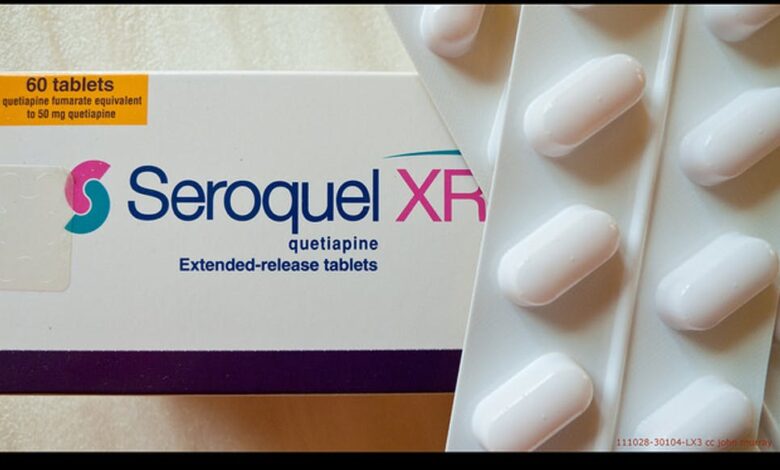Seroquel (Quetiapine): Uses, Dosage, Side Effects, Death Rate

Seroquel is a brand of Quetiapine, a class of medications called atypical antipsychotics. It works by changing the activity of certain natural substances in the brain. Seroquel is used to treat the symptoms of schizophrenia (a mental illness that causes disturbed or unusual thinking, loss of interest in life, and strong or inappropriate emotions). Quetiapine tablets and extended-release tablets are also used alone or with other medications to treat episodes of mania (frenzied, abnormally excited or irritated mood) or depression in patients with bipolar disorder (manic depressive disorder; a disease that causes episodes of depression, episodes of mania, and other abnormal moods).
In addition, Seroquel tablets are used with other medications to prevent episodes of mania or depression in patients with bipolar disorder. Extended-release tablets are also used along with other medications to treat depression. Seroquel tablets may be used as part of a treatment program to treat bipolar disorder and schizophrenia in children and teenagers.
How should I use Seroquel?
The usual recommended starting dose for schizophrenia is 25 mg twice daily. Quetiapine is usually started with a low dose in order to allow the body to get used to it. This dose is increased as tolerated to a target dose of 150 mg twice daily. No more than 400 mg twice daily should be taken as the safety of higher doses has not been established.
For manic episodes associated with bipolar disorder, the recommended starting dose is 50 mg twice daily. This dose is increased every day up to 400 mg twice daily as tolerated. Most people respond to doses between 200 mg and 400 mg twice daily.
For depressive episodes associated with bipolar disorder, the recommended starting dose is 50 mg once daily, usually at bedtime. This dose is increased every day up to 300 mg once daily as tolerated.
Many things can affect the dose of a medication that a person needs, such as body weight, other medical conditions, and other medications. If your doctor has recommended a dose different from the ones listed here, do not change the way that you are taking the medication without consulting your doctor.
Seroquel can be taken with or without food. Do not stop taking this medication or change the time of the day you take it without consulting your doctor.
It is important to take this medication exactly as prescribed by your doctor to ensure that you are getting the maximum benefit from the medication.
What happens if I miss a dose?
If you miss a dose by a few hours, take it as soon as possible and continue with your regular schedule. If most of the day has passed since the missed dose, skip the missed dose and continue with your regular dosing schedule. Do not take a double dose to make up for a missed one. If you are not sure what to do after missing a dose, contact your doctor or pharmacist for advice.
What happens if I overdose?
Seek emergency medical attention or call the Poison Help line at 1-800-222-1222. An overdose of quetiapine can be fatal.
What to avoid
Avoid drinking alcohol, dangerous side effects could occur.
Seroquel may impair your thinking or reactions. Avoid driving or operating machinery until you know how this medicine will affect you.
Avoid getting up too fast from a sitting or lying position, or you may feel dizzy. Dizziness or severe drowsiness can cause falls, fractures, or other injuries.
Avoid becoming overheated or dehydrated during exercise and in hot weather. You may be more prone to heat stroke.
What side effects can this medication cause?
Seroquel may cause side effects. Tell your doctor if any of these symptoms are severe or do not go away:
• dizziness, feeling unsteady, or having trouble keeping your balance
• pain in the joints, back, neck, or ears
• weakness
• dry mouth
• vomiting
• indigestion
• constipation
• gas
• stomach pain or swelling
• increased appetite
• excessive weight gain
• stuffy nose
• headache
• pain
• irritability
• difficulty thinking or concentrating
• difficulty speaking or using language
• loss of coordination
• unusual dreams
• numbness, burning, or tingling in the arms or legs
• missed menstrual periods
• breast enlargement in males
• discharge from the breasts
• decreased sexual desire or ability
Some side effects can be serious. If you experience any of the following symptoms, call your doctor immediately or get emergency medical treatment:
• fainting
• falling
• seizures
• changes in vision
• uncontrollable movements of your arms, legs, tongue, face, or lips
• painful erection of the penis that lasts for hours
• fever
• muscle stiffness, pain, or weakness
• excess sweating
• fast or irregular heartbeat
• confusion
• unusual bleeding or bruising
• sore throat, fever, chills, difficult or painful urination, or other signs of infection
• hives
• rash
• blisters
• tightening of the neck muscles or the throat
• tongue sticking out
• difficulty breathing or swallowing
Seroquel may cause other side effects. Call your doctor if you have any unusual problems while taking this medication.
Quetiapine may cause cataracts. You will need to have eye exams to check for cataracts at the beginning of your treatment and every six months during your treatment. Talk to your doctor about the risks of taking quetiapine.
Seroquel Death Rate
Seroquel may cause a condition that affects the heart rhythm (QT prolongation). QT prolongation can infrequently result in serious (rarely fatal) fast/irregular heartbeat and other symptoms (such as severe dizziness, fainting). Misuse of this drug can result in fatal overdose.
Seroquel has been implicated in cardiac arrests and sudden deaths of combat veterans. Known by soldiers as “Serokill,” Studies indicate the greatest increases in mortality rate occurred among patients treated with atypical antipsychotics such as Seroquel and higher doses of this drug were associated with higher mortality rates. However, new information from a review appears to counter this conclusion.
Seroquel Safety Information
Important warning for older adults with dementia: Studies have shown that older adults with dementia (a brain disorder that affects the ability to remember, think clearly, communicate, and perform daily activities and that may cause changes in mood and personality) who take antipsychotics (medications for mental illness) such as quetiapine have an increased risk of death during treatment.
Seroquel is a controlled drug but it is not approved by the Food and Drug Administration (FDA) for the treatment of behavioral problems in older adults with dementia. Talk to the doctor who prescribed this medication if you, a family member, or someone you care for has dementia and is taking quetiapine. For more information visit the FDA website: http://www.fda.gov/Drugs
Important warning for people who have depression: A small number of children, teenagers, and young adults (up to 24 years of age) who took medications for depression during clinical studies became suicidal (thinking about harming or killing oneself or planning or trying to do so). Children, teenagers, and young adults who take antidepressants to treat depression or other mental illnesses may be more likely to become suicidal than children, teenagers, and young adults who do not take antidepressants to treat these conditions. However, experts are not sure about how great this risk is and how much it should be considered in deciding whether a child or teenager should take an antidepressant. Children younger than 10 years of age should not normally take quetiapine, but in some cases, a doctor may decide that quetiapine is the best medication to treat a child’s condition.
You should know that your mental health may change in unexpected ways when you take quetiapine or other antidepressants even if you are an adult over age 24. You may become suicidal, especially at the beginning of your treatment and any time that your dose is increased or decreased. You, your family, or your caregiver should call your doctor right away if you experience any of the following symptoms: new or worsening depression; thinking about harming or killing yourself, or planning or trying to do so; extreme worry; agitation; panic attacks; difficulty falling asleep or staying asleep; aggressive behavior; irritability; acting without thinking; severe restlessness; and frenzied abnormal excitement. Be sure that your family or caregiver knows which symptoms may be serious so they can call the doctor when you are unable to seek treatment on your own.
Your healthcare provider will want to see you often while you are taking quetiapine, especially at the beginning of your treatment. Be sure to keep all appointments for office visits with your doctor.
The doctor or pharmacist will give you the manufacturer’s patient information sheet (Medication Guide) when you begin treatment with quetiapine. Read the information carefully and ask your doctor or pharmacist if you have any questions. You also can obtain the Medication Guide from the FDA website: http://www.fda.gov/Drugs/DrugSafety/ucm085729.htm.
No matter what your age, before you take an antidepressant, you, your parent, or your caregiver should talk to your doctor about the risks and benefits of treating your condition with an antidepressant or with other treatments. You should also talk about the risks and benefits of not treating your condition. You should know that having depression or another mental illness greatly increases the risk that you will become suicidal. This risk is higher if you or anyone in your family has or has ever had bipolar disorder (mood that changes from depressed to abnormally excited) or mania (frenzied, abnormally excited mood) or has thought about or attempted suicide. Talk to your doctor about your condition, symptoms, and personal and family medical history. You and your doctor will decide what type of treatment is right for you.





